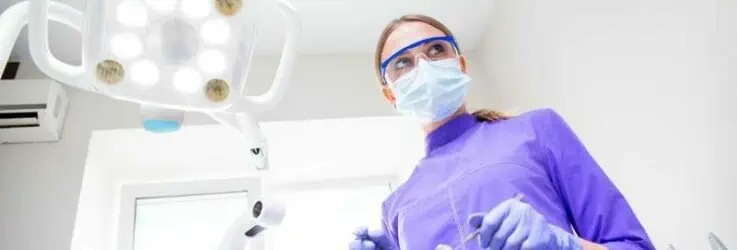How To Handle Dental Emergencies

Dental emergencies can occur unexpectedly, causing pain, discomfort, and anxiety. Knowing how to handle these situations promptly and effectively is crucial to minimize pain, prevent further damage, and ensure timely care. In this comprehensive guide, your dentist in Douglasville explores common dental emergencies and provides step-by-step instructions on how to handle them.
Contact Your Dentist
Different types of dental emergencies require different kinds of care, so it’s important to contact your dentist in Douglasville quickly if you experience a dental emergency so they can diagnose and properly treat your specific needs. While there are steps you can take to help reduce the risk of additional damage and temporarily relieve discomfort, you should always let your dentist know if you have a dental emergency.
Toothaches
Toothaches can pop up out of nowhere and can cause mild discomfort or even excruciating pain. Here’s what you can do:
- Rinse your mouth with warm saltwater to alleviate pain and reduce inflammation.
- Gently floss around the affected tooth to remove any trapped food particles that may be causing the pain.
- Take over-the-counter pain relievers as directed, but avoid placing aspirin directly on the tooth or gums.
- Apply a cotton ball soaked with clove oil to the area. Clove oil contains a natural anesthetic and antibacterial that helps reduce inflammation.
Knocked-Out Tooth
If a tooth gets knocked out, immediate action is crucial for the best chance of saving it:
- Handle the tooth by the crown (the top part) and avoid touching the root.
- Rinse the tooth gently with water if it’s dirty, but do not scrub or remove any attached tissues.
- Try to reinsert the tooth into its socket, making sure it’s facing the correct way. Apply gentle pressure to hold it in place.
- If you cannot reinsert the tooth, place it in a container of milk or saliva and seek dental assistance immediately. Time is of the essence when it comes to saving a knocked-out tooth.
Broken or Chipped Tooth
If you break or chip a tooth, follow these steps:
- Rinse your mouth with warm water to clean the area.
- Save any broken pieces of the tooth.
- If there’s bleeding, apply gentle pressure with a clean gauze or cloth.
- Your dentist in Douglasville will evaluate the extent of the damage and recommend the appropriate treatment, which may include dental bonding, a crown, or other restorative dentistry options.
Lost Filling or Crown
Losing a filling or crown can be uncomfortable, but temporary solutions are available:
- Clean the affected tooth and apply dental cement or temporary dental filling material, available at most pharmacies.
- Avoid chewing on the affected side until you can see your dentist for a permanent solution
Soft Tissue Injuries
Injuries to the lips, gums, cheeks, or tongue can result in bleeding and discomfort. Here’s what to do:
- Rinse your mouth with warm saltwater to clean the area.
- Apply gentle pressure with a clean gauze or cloth to control bleeding.
- If bleeding persists or the injury is severe, seek immediate medical attention or visit the emergency room.
Handling dental emergencies requires prompt action and appropriate care. By following the steps outlined in this comprehensive guide, you can effectively manage dental emergencies. However, it’s essential to remember that these steps are temporary measures, and seeking professional dental care from your dentist as soon as possible is crucial for proper diagnosis and treatment.
What Happens If You Don’t Wear a Mouthguard?

Engaging in physical activities without the proper protective gear can have serious consequences. When many people think of protective gear, they often think of things like helmets or shin guards. But one area that’s often overlooked, and one that’s important to your dentist in Douglasville, is the use of mouthguards. However, if you don’t wear a mouthguard during activities that pose a risk of dental injuries, it can increase the risk of long-term damage to your teeth, jaw, and overall oral health.
Dental Injuries & Trauma
One of the most common consequences of not wearing a mouthguard is an increased risk of dental injuries. Activities such as contact sports or recreational hobbies can lead to direct impacts on the mouth, causing broken or chipped teeth, tooth loss, and damage to the soft tissues in the oral cavity. These injuries not only require immediate dental attention but can also lead to long-term dental problems and the need for extensive dental treatments.
Jaw Fractures & TMJ Disorders
The absence of a mouthguard puts the jaw at greater risk of fractures and dislocations. With a mouthguard, the force of any strong impact on the jaw during physical activities would be absorbed by the mouthguard. Without that protection, blows to the jaw can result in severe injuries, leading to pain, difficulty in opening and closing the mouth, and TMJ disorders. These conditions can cause chronic discomfort, limited jaw movement, and problems with eating, speaking, and overall quality of life.
Tooth Movement & Root Damage
Without the protection of a mouthguard, teeth are vulnerable to being moved out of their original positions, changing their appearance. Impacts on the mouth can cause teeth to shift, rotate, or even be pushed into the jawbone. Additionally, the force from an impact can damage the tooth roots, leading to root fractures, nerve damage, and potential tooth loss. Restorative dentistry treatment such as root canals, dental implants, or orthodontic procedures from your dentist in Douglasville may be necessary to repair the damage caused by tooth displacement and root injuries.
Increased Risk of Concussions
Even though the primary purpose of mouthguards is to protect the teeth, they can also help reduce the risk of concussions. The cushioning effect of a mouthguard can absorb some of the impact forces, reducing the transmission of those forces to the head and potentially minimizing the risk of brain injuries. Without this protective barrier, the likelihood of sustaining a concussion increases, which can have both serious short-term and long-term consequences.
Choosing not to wear a mouthguard during physical activities can lead to severe consequences for your oral health and overall health. To protect your smile and safeguard your future, wear a properly fitted mouthguard during any activity that poses a risk to your oral health.



